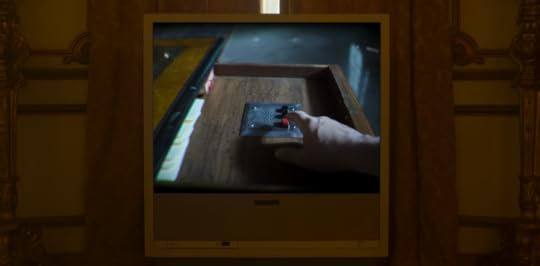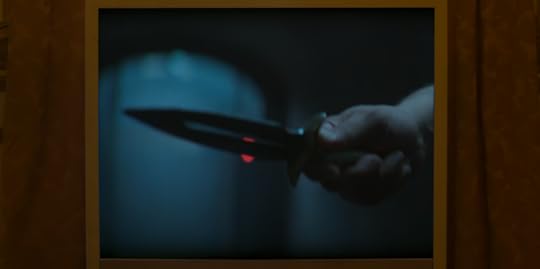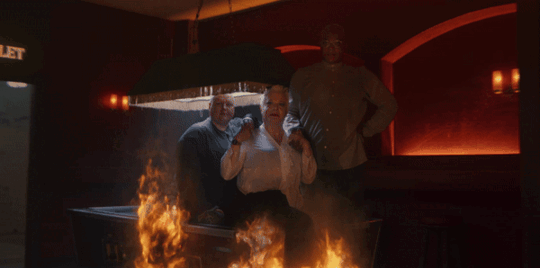The Gods of Kaos
This is not an ode to Jeff Goldblum, even though he is magnificent as Zeus and the reason I started watching Kaos; and Nabhaan Rizwan, whose performance as Dionysus is a fantastic blend of comedy and pathos. Neither is this a review of writer and creator Charlie Covell’s excellent show, which reimagines stories and characters from classical Greek mythology. The show is lavishly-imagined, has a dazzling cast, does a fantastic job of using music as a storytelling tool, and has been masterfully directed by Georgi Banks-Davies and Runyararo Mapfumo. Ok, those two sentences were a mini review, but that’s not the point of this post.
I’m here to preface this week’s column, which was first hard to write and then hard to compress. I don’t usually bring personal…stuff into my work writing, but this one time, it felt appropriate. Anyway, after much wrangling, chopping and rewording, I thought I’d managed to cut the column down to size for print, but I was wrong.

So the compressed version is here, in today’s edition of Hindustan Times and the unedited version is below.
Towards the end of Netflix’s hit series Kaos, king of the gods Zeus hosts a watch party. He invites Hera, Poseidon and Dionysus over to Olympus to witness the devout President Minos disprove a prophecy that states he will be killed by his child. In this fascinating alternative reality that creator and writer Charlie Covell has imagined, the gods breathe the same air as mortals and every human is born with a prophecy, written for them by the Fates. It turns out Zeus was once a mortal and his prophecy says his family will fall, allowing “Kaos” to reign. Even though Zeus has long cast aside his humanity to become the thundering deity that he is in the present, the appearance of a new wrinkle reduces him to a nervous wreck. He begins to suspect his prophecy has been set in motion and spirals into maniacal cruelty as he attempts to outwit fate and convince himself that his godliness is intact.
In Kaos, the gods have a range of powers, but the most important symptom of godhood is immunity from death and the source of this divine immortality is Meander water.

(The Meander at Olympus, in Kaos.)
This elixir is — SPOILER ALERT — drawn from dead humans. On earth, people live god-fearing lives in the hope of being “renewed”, or rewarded with a better life when they’re reborn. However, reincarnation is a fiction peddled by the gods. In truth, those who seek renewal end up in the Nothing, a secret part of Hades’s Underworld where the dead stand in silent, frozen agony. Their essence is harvested to create Meander water, which comes up as a gravity-defying, circular fountain in the gardens of Olympus. Zeus, Hera and Poseidon repeatedly dismiss mortals as contemptibly puny and flawed. It’s only when we realise what they already know about the Meander that Kaos’s core irony is revealed — it is the essence of humanity that makes the gods divine.
Coming back to the watch party: President Minos is ordered by the gods to upend his prophecy so that Zeus may be reassured that the will of the Fates can be defied. And so the gods gather to watch a man enter a labyrinth of dungeons, dagger in hand, to kill his son.




A curious parallel unfolds as this particular moment plays out in Kaos. Just as the gods sit in Zeus’s home to watch Minos on an vintage-inspired TV, so do we watch the gods (and Minos) on our screens at home. What we see mirrors what the gods of Kaos see, creating an Escher-esque illusion of screens reflecting one another. If Minos and other mortals are playthings who are idle entertainment for the Olympians, then Zeus, Hera and the others in Kaos are much the same for audiences around the world. They’re doing their best to dazzle us in the hope of being renewed for successive seasons; much like the humans in Kaos live in hope of “renewal”. (Covell must have noticed the meta possibilities of using that particular word in her world-building.)
The way Covell and the show’s directors set up the screen-within-the-screen sequences turns audiences into the gods whose entertainment are the on-screen gods; just as humans in the show are for Zeus, Dionysus, Hera and Poseidon.
Though the gods revel in their powers, Kaos quickly establishes that humans are quite beyond their control. Zeus, Hera and Poseidon do their best to manipulate events and people to do their bidding, but with little actual effect. The situation is similar with the show’s off-screen ‘gods’. The importance given to views, engagement and box office earnings make audiences seem powerful and influential, but we have little actual say over what is commissioned, released and platformed. For instance, a second season of The Rings of Power is out on Prime Video despite a first season that was disappointing both in terms of critical reception and also viewership numbers. In contrast, the historical fantasy My Lady Jane was well-received and developed a cult following after its release, but still got cancelled instead of getting renewed for another season. Despite this, My Lady Jane remains a significantly better work and a more entertaining watch than The Rings of Power, the renewal of which appears to have more to do with Amazon founder Jeff Bezos’s ego and Amazon Studios wanting a franchise to milk.
Kaos effectively sets up a hierarchy based on knowledge and power that includes the audience in its structure. At the bottom are the mere mortals, who live their everyday lives shrouded in illusions and lies propagated by the gods. For example, Pious Agatha, who offers herself as a human sacrifice to Olympus, is convinced her devoutness will earn her renewal, but she ends up in the Nothing. Above these humans are Zeus and the Olympian gods, cocooned in their belief that they’ve got humans under their control. The audience on the other side of the screen occupies the next higher rung because they know what the gods don’t know (but Kaos’s fabulous trio of Fates do): Free will is a confounding detail and love can upend best-laid plans.

(Sam Buttery, Suzie Eddie Izzard and Ché as the Fates.)
During the watch party, Zeus and the other gods track Minos as he goes into the labyrinth. That they can do this makes them feel like all-seeing divinities (with snacks). Yet their perspective is limited to what Minos knows and sees — a detail we the audience know, because we’ve seen Ari, Minos’s daughter, enter the labyrinth earlier. Everyone, from Minos to the Netflix subscriber, acts under the illusion of having the power of knowledge, but for every rung of the hierarchy, there is a surprise.
Minos is surprised by the gods; the gods and Minos are surprised when they see Ari; the audience, the gods and Minos are shocked when Ari reveals everyone had misread the prophecy, and ends up killing her father. The only one unsurprised by the twists and turns is Covell, by virtue of being the show’s creator and writer. (Being the creator of an imaginary world isn’t power enough. Just ask George R.R. Martin, who wrote a thoroughly disgruntled post — which he later deleted — about House of the Dragon.)
Yet despite the knowledge and power that come with being the mastermind of Kaos, for Covell to turn what they have imagined into reality, they need the fake gods and real audiences. Without the ignorant others doing their bits, Covell stops short of realising themself as a creator. (Suddenly, the detail that the Fates are non-binary, like Covell, feels significant.)
Whether it’s Zeus devouring news reports on the disasters he’s unleashed, or Hera eavesdropping on people in confessional boxes, the humans give the gods a sense of purpose. The divine of Kaos don’t necessarily need worshippers, but they do need humanity. Mortals make the immortals feel alive and literally give the latter their powers. We as viewers have a similar relationship with art. We turn to it for comfort, distraction, inspiration and more. We approach it with a sense of entitlement, offering little in return; as though art’s existential purpose is to be consumed. Yet Covell’s retelling of the Greek myths, with wonderful additions like individualised prophecies and Hera’s Tacitas (who put the mute in mutilated), is brilliant and richly creative whether or not it hits Netflix’s top 10. Similarly, the magnificent performances by the cast of Kaos — particularly Jeff Goldblum as Zeus, Nabhaan Rizwan as Dionysus, Janet Mc Teer as Hera, Stephan Dillane as Promtheus, Michelle Greenidge as the Tacita and Misia Butler as Caenaeus — don’t become any less accomplished if Netflix commits the mortal sin of not renewing the show. They may have been commissioned for our entertainment, but what they’ve eventually created along with the rest of Kaos’s team exists independent of the audience.
Of course, being a consumer of culture doesn’t have to feel as exploitative as Zeus and the gods are with humans. Over the past two weeks, my family and I have had to grapple with the jarring reality of my father being diagnosed with cancer. We’re living in hope that the disease can be beaten into remission and while we soldier towards whatever is fated, I find us turning to art in different ways. My mother stayed up nights adapting a short story into a short play for an amateur theatre group to perform during the upcoming Durga Puja. Yesterday, Hindustani classical singer Manali Bose’s intricate taankari rippled through our home after my father found a video of hers while on social media. Last week, after an impossibly long day, Mohammed Rafi sang “Main Zindagi Ka Saath Nibhata Chala Gaya” to the three of us.
We sat in our study, where three walls are stacked with books of fiction and non-fiction, collected and inherited, and Rafi crooned about turning every concern into flyaway dust. We sat in a silence that carried in it both our fatigue, but also our determination to find every little joy we can in defiance of this situation; to hold hope in our sights; to marvel at the enchantment of Rafi’s voice.
The song is from the 1961 film Hum Dono and Rafi died decades ago, as did music director Jaidev and lyricist Sahir Ludhianvi. Yet here we were, drawing on their magic as though they were in the room with us.
In Kaos, the Nothing is an archive of souls that seems infinite. Its closest equivalent in the real world is perhaps the internet, with its algorithms that petrify us into lifeless, agency-less versions of ourselves. Yet early adopters of the internet like me know that is not all the digital space can be. We discovered worlds through the internet and felt like gods because of the way the medium let us defy boundaries of legality and geography to access works of art that were gatekept from us by institutions and commerce. We became better versions of ourselves because of what was online.
Even though it is today threatened with stagnation and toxicity, the internet is also a realm in which humans have been at their most inventive, where art and artists thrive and become immortal. It preserves work, ensuring art is not lost and may be found by those who need it. In a way, the song from Hum Dono has become eternal despite being a relic of the past because it is online and just a click away. It loses nothing with each listen. If anything, the song comes a little more alive because new memories are made around it. The melody swats despair away with every determinedly upbeat note, and I’m reminded of a line spoken by the one character in Kaos who can restore life to the dead: “All the best things are human.”
Deepanjana Pal's Blog
- Deepanjana Pal's profile
- 34 followers



